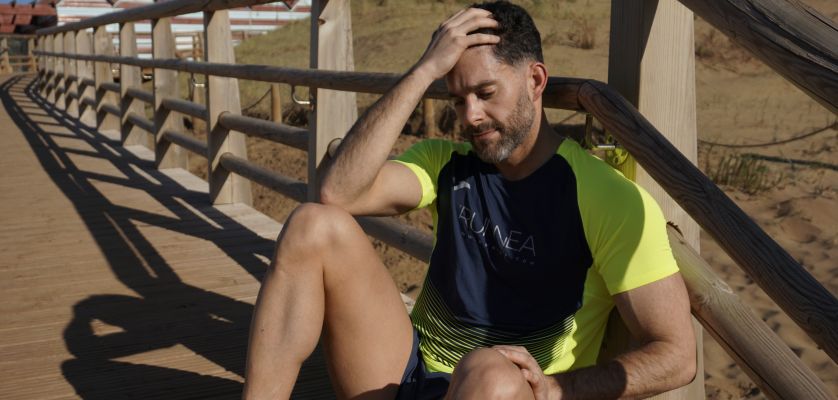A new week and a new post from Runnea academy, this time we talk about psychology. Do not panic, we are in good hands. Today we chat with María and Juan Cañadas, responsible of Actitud Mental Positiva Psicólogos and experts in clinical and sports psychology.
Runners, do you think that the support of a psychologist is important when it comes to training and overcoming the day to day at a sporting level? Read on...
Xabi Llano (Runnea Academy Coach) Hello Juan, welcome to the Runnea Academy blog. Tell us who you are at a professional level and how you help athletes in their daily life.
Juan Cañadas: As you said in the presentation I am a psychologist, and also a passionate about sport in general. At a professional level I have been working for more than 12 years in the clinical and sports field. I work with athletes from different disciplines (paddle tennis players, triathletes, soccer players, golf players, softball players, speed skaters, athletes from different disciplines, popular runners, among others) both at amateur and professional level, both with children and adults.
XL: What do you think if in today's section we talk about what makes a runner nervous on a daily basis? We recently talked about what to do if I can't train for more than a day in our blog. Tell us why it makes us so nervous and why it bothers us so much not being able to add training hours when we really "don't live from it" and it doesn't imply an exclusive dedication.
JC: Well, *we don't live from it" because it's probably not our job, but that doesn't mean it's not an important part of our life.
Probably the nerves and discomfort for not being able to train will be related to two aspects: first with the fact that training provides us with a well-being in itself and second, because if we have a specific goal and we cannot fulfill our training plan, doubts and insecurity may appear about whether we will achieve it.
Even so, this can vary a lot from one person to another, the personality and experience of each person influence a lot.
XL: What do you say Juan about those days when the training doesn't work.... What happens to us? What are the factors that cause us not to find the perfect training, taking into account that I feel good physically?
JC: In my opinion, there is no perfect training, if by this we mean to be every day at 100% performance, the basis of a good training is not a particular day, it is the continuity and perseverance of my work plan (along with nutrition, rest and other factors).
It is important that we are clear that there will be better and worse days AND that not every day our performance will be the same, here there are many factors that may be influencing and not all of them we can control, we must learn to be tolerant.
When you say "the training is not going well", I am shocked, because if today you have trained and fulfilled your daily goal, even if your sensations have not been the best, I consider the training to be OK.
XL: What if I have more than one day like this? As my own experience I see that my mind gives way to a general distrust. What can I do?
JC: Continuing my point from the previous question, if we manage to be tolerant with our best and worst days, and understand that not every day we can be at 100%, it will be more difficult for this to affect our confidence.
It is normal to have bad days, it does not mean that we are not training well, trust in yourself, in your training plan and continue, you will see how you will find your feelings again
If despite this we reach the situation you mentioned, it might be appropriate to reflect on how I am facing the training, my goal, my self-demand or other factors that may be influencing me (rest, stress, eating habits, etc.).
XL: Juan, let's talk about pre-race nerves... Who hasn't had them? Who hasn't had them? There are mixed feelings: euphoria, excitement, fears, motivation... How do we fight them? Is there any technique to overcome this difficult moment?
JC: Well, the first thing is not to perceive this moment as something so difficult, right? If I'm perceiving it that way it's probably because I'm pushing myself too hard
It's important that we approach racing as something positive and that our goal is realistic and motivating, so that we can adjust our self-demand appropriately.
Of course, it is normal to feel nerves and uncertainty, if we have trained well enough this will be a source of confidence to face this test.
XL: To end our interview Juan, I would like to ask you something that many of our readers are wondering... If I am not a professional athlete, why do I need a sports psychologist? Can I really get positive results?
JC: First of all, of course it would help to obtain positive results, or better said, to improve performance, if we compare it with not going. In the same way that having a coach who prepares and advises you or not having one, or going to a physiotherapist or not, for example, has an influence.
With this I do not mean that you need a sports psychologist, if you are happy with your sport and enjoy it, you probably do not need it. However, if you are suffering, blocked or experiencing problems related to your sport, a psychologist can help you. Also if you want to progress or face new goals it can be of great help, and also, if you have suffered an injury or traumatic episode.
Thank you very much Xabi and a big hug to all the people at Runnea Academy.
If you want to know more about them, visit them on their website or on their social profiles:
Read more news about: Running News



























